HI5015 Commercial Law Report: Loewen Group Inc. vs. USA Analysis
VerifiedAdded on 2023/06/05
|11
|2845
|196
Report
AI Summary
This report provides a detailed analysis of the Loewen Group Inc. and Raymond L. Loewen vs. the USA case, focusing on the legal aspects of international trade and enterprise. The report examines the background of the dispute, which involves a $500 million damage award against a Canadian company by a Mississippi court and the subsequent challenge based on the North American Free Trade Agreement (NAFTA). The report outlines the facts of the case, including the claims made under NAFTA's Chapter 11, and the legal issues presented, such as the nationality of the company and the jurisdiction of the tribunal. It also discusses the arguments of both the plaintiffs and the respondent, and the final decision of the tribunal, which rejected the claims due to jurisdictional issues. The significance of the decision is highlighted, emphasizing the importance of clear jurisdiction and the impact of a company's international identity on the outcome of such cases. The report serves as a valuable resource for understanding the complexities of international law and the application of trade agreements like NAFTA.
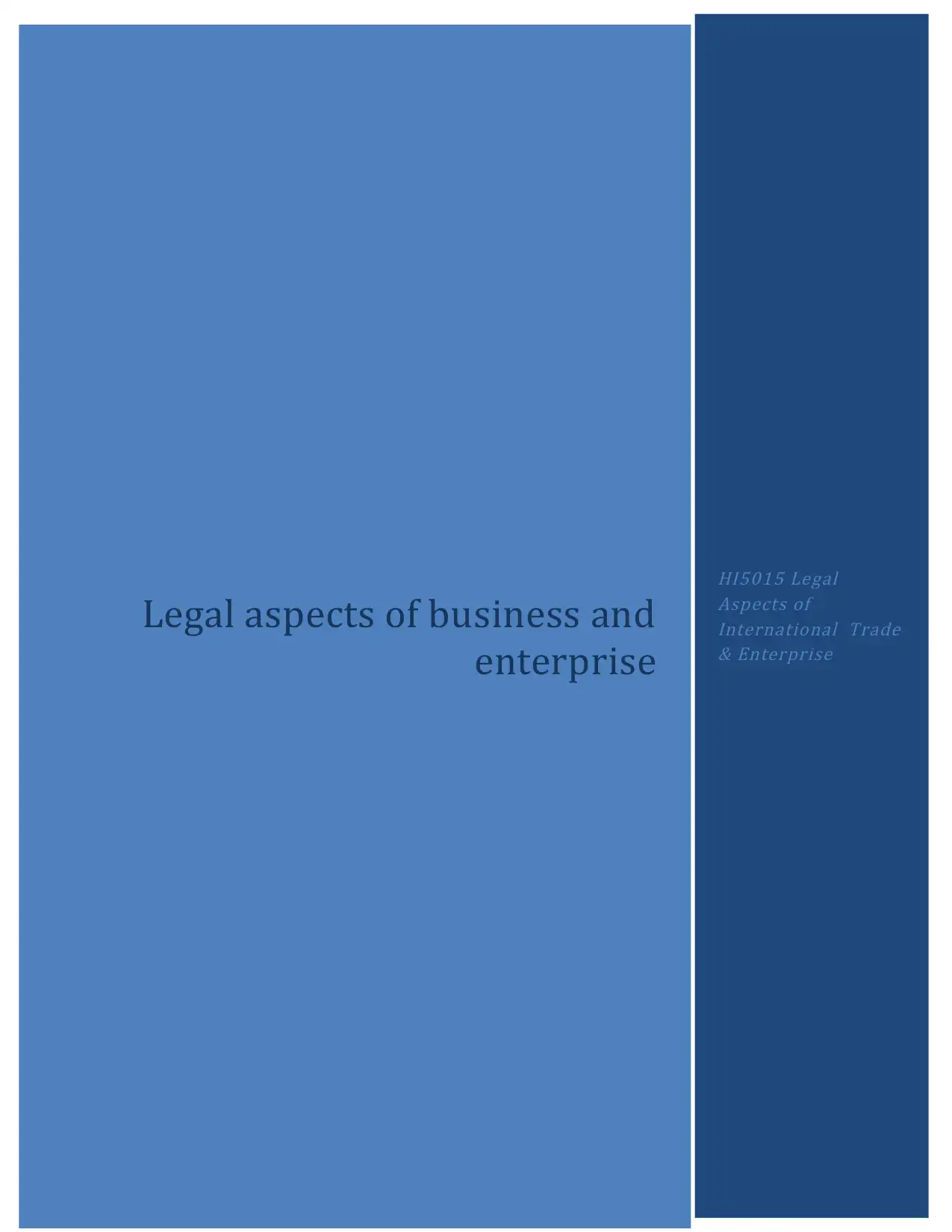
Running ead C MM RC A AH : O E I L L W 0
Legal aspects of business and
enterprise
HI5015 Legal
Aspects of
International Trade
& Enterprise
Legal aspects of business and
enterprise
HI5015 Legal
Aspects of
International Trade
& Enterprise
Paraphrase This Document
Need a fresh take? Get an instant paraphrase of this document with our AI Paraphraser
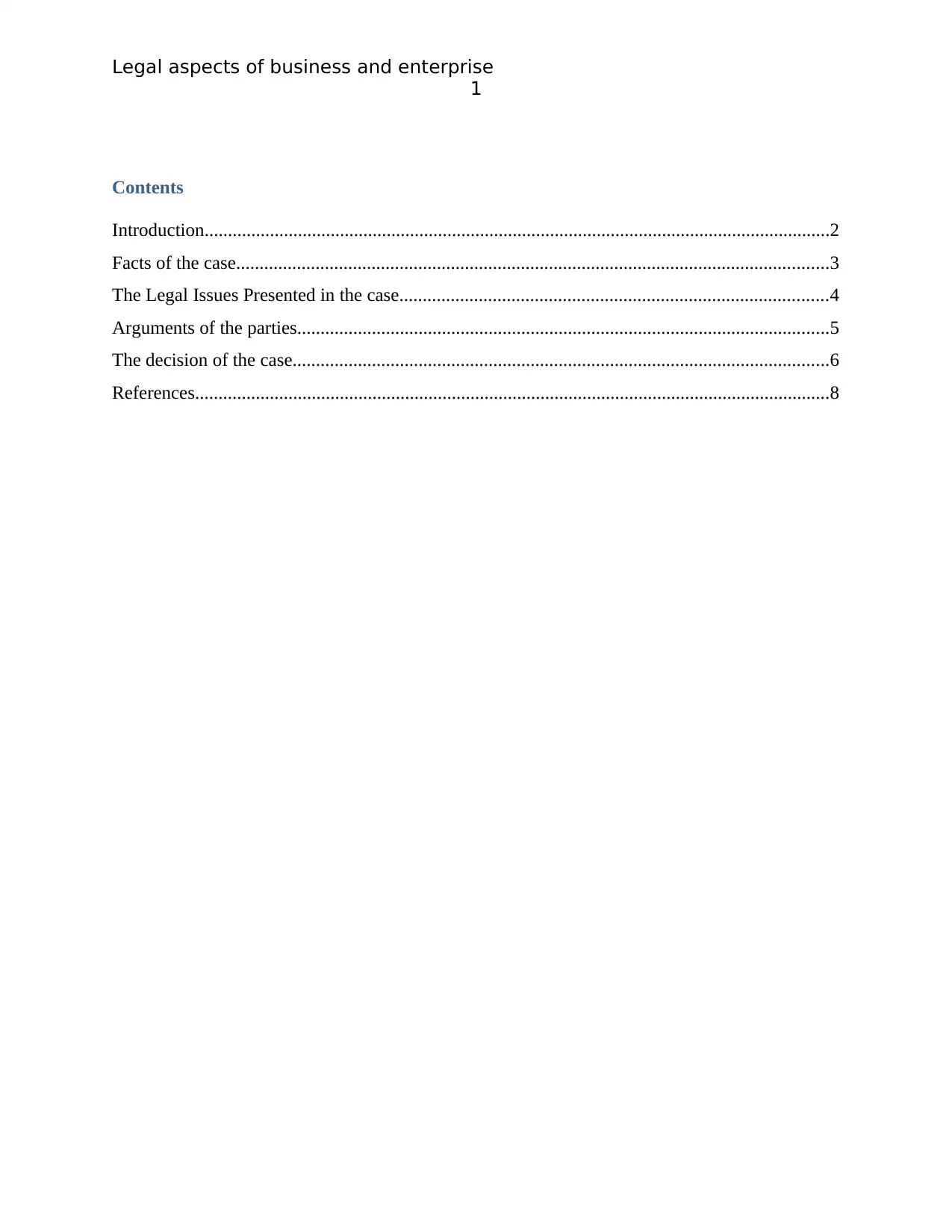
Legal aspects of business and enterprise
1
Contents
Introduction......................................................................................................................................2
Facts of the case...............................................................................................................................3
The Legal Issues Presented in the case............................................................................................4
Arguments of the parties..................................................................................................................5
The decision of the case...................................................................................................................6
References........................................................................................................................................8
1
Contents
Introduction......................................................................................................................................2
Facts of the case...............................................................................................................................3
The Legal Issues Presented in the case............................................................................................4
Arguments of the parties..................................................................................................................5
The decision of the case...................................................................................................................6
References........................................................................................................................................8
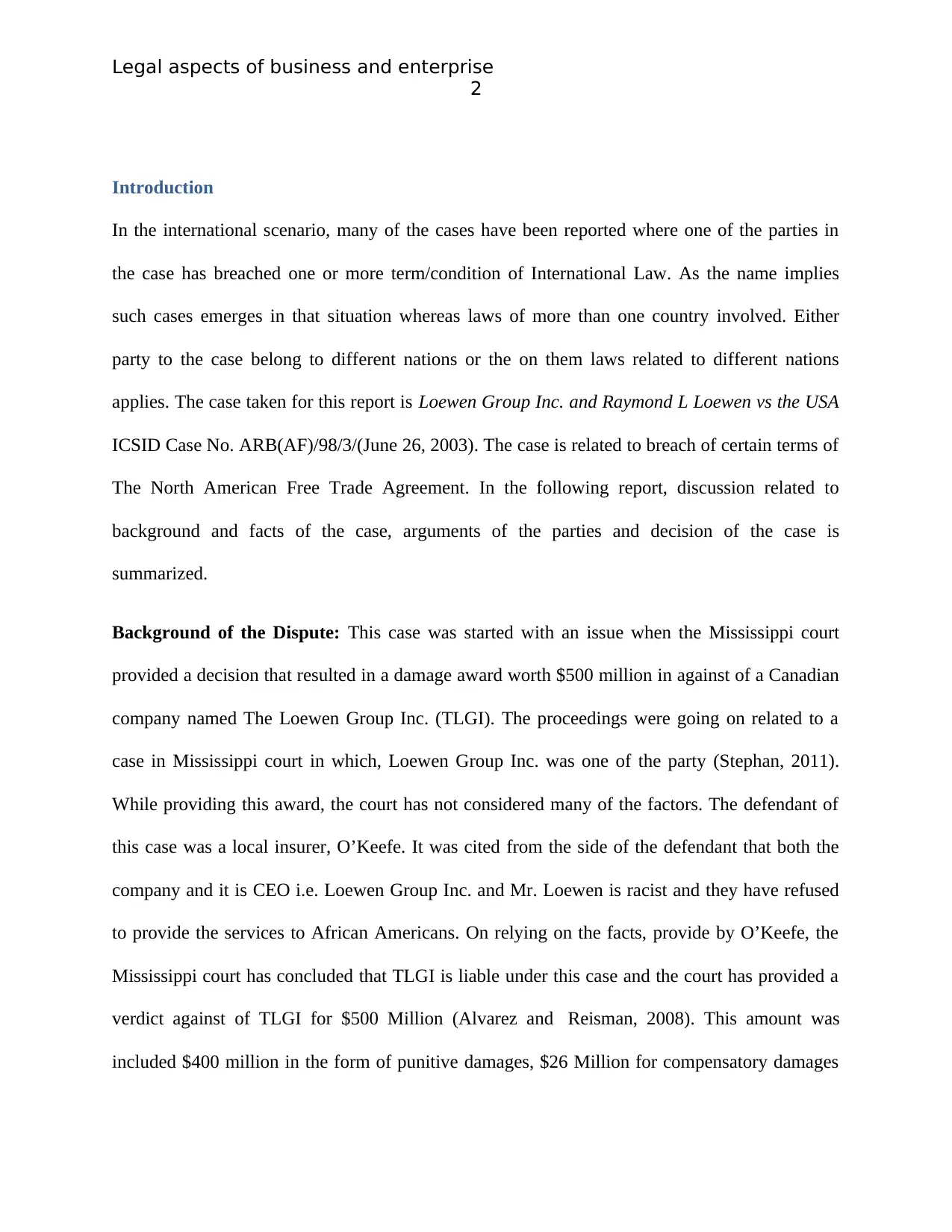
Legal aspects of business and enterprise
2
Introduction
In the international scenario, many of the cases have been reported where one of the parties in
the case has breached one or more term/condition of International Law. As the name implies
such cases emerges in that situation whereas laws of more than one country involved. Either
party to the case belong to different nations or the on them laws related to different nations
applies. The case taken for this report is Loewen Group Inc. and Raymond L Loewen vs the USA
ICSID Case No. ARB(AF)/98/3/(June 26, 2003). The case is related to breach of certain terms of
The North American Free Trade Agreement. In the following report, discussion related to
background and facts of the case, arguments of the parties and decision of the case is
summarized.
Background of the Dispute: This case was started with an issue when the Mississippi court
provided a decision that resulted in a damage award worth $500 million in against of a Canadian
company named The Loewen Group Inc. (TLGI). The proceedings were going on related to a
case in Mississippi court in which, Loewen Group Inc. was one of the party (Stephan, 2011).
While providing this award, the court has not considered many of the factors. The defendant of
this case was a local insurer, O’Keefe. It was cited from the side of the defendant that both the
company and it is CEO i.e. Loewen Group Inc. and Mr. Loewen is racist and they have refused
to provide the services to African Americans. On relying on the facts, provide by O’Keefe, the
Mississippi court has concluded that TLGI is liable under this case and the court has provided a
verdict against of TLGI for $500 Million (Alvarez and Reisman, 2008). This amount was
included $400 million in the form of punitive damages, $26 Million for compensatory damages
2
Introduction
In the international scenario, many of the cases have been reported where one of the parties in
the case has breached one or more term/condition of International Law. As the name implies
such cases emerges in that situation whereas laws of more than one country involved. Either
party to the case belong to different nations or the on them laws related to different nations
applies. The case taken for this report is Loewen Group Inc. and Raymond L Loewen vs the USA
ICSID Case No. ARB(AF)/98/3/(June 26, 2003). The case is related to breach of certain terms of
The North American Free Trade Agreement. In the following report, discussion related to
background and facts of the case, arguments of the parties and decision of the case is
summarized.
Background of the Dispute: This case was started with an issue when the Mississippi court
provided a decision that resulted in a damage award worth $500 million in against of a Canadian
company named The Loewen Group Inc. (TLGI). The proceedings were going on related to a
case in Mississippi court in which, Loewen Group Inc. was one of the party (Stephan, 2011).
While providing this award, the court has not considered many of the factors. The defendant of
this case was a local insurer, O’Keefe. It was cited from the side of the defendant that both the
company and it is CEO i.e. Loewen Group Inc. and Mr. Loewen is racist and they have refused
to provide the services to African Americans. On relying on the facts, provide by O’Keefe, the
Mississippi court has concluded that TLGI is liable under this case and the court has provided a
verdict against of TLGI for $500 Million (Alvarez and Reisman, 2008). This amount was
included $400 million in the form of punitive damages, $26 Million for compensatory damages
⊘ This is a preview!⊘
Do you want full access?
Subscribe today to unlock all pages.

Trusted by 1+ million students worldwide
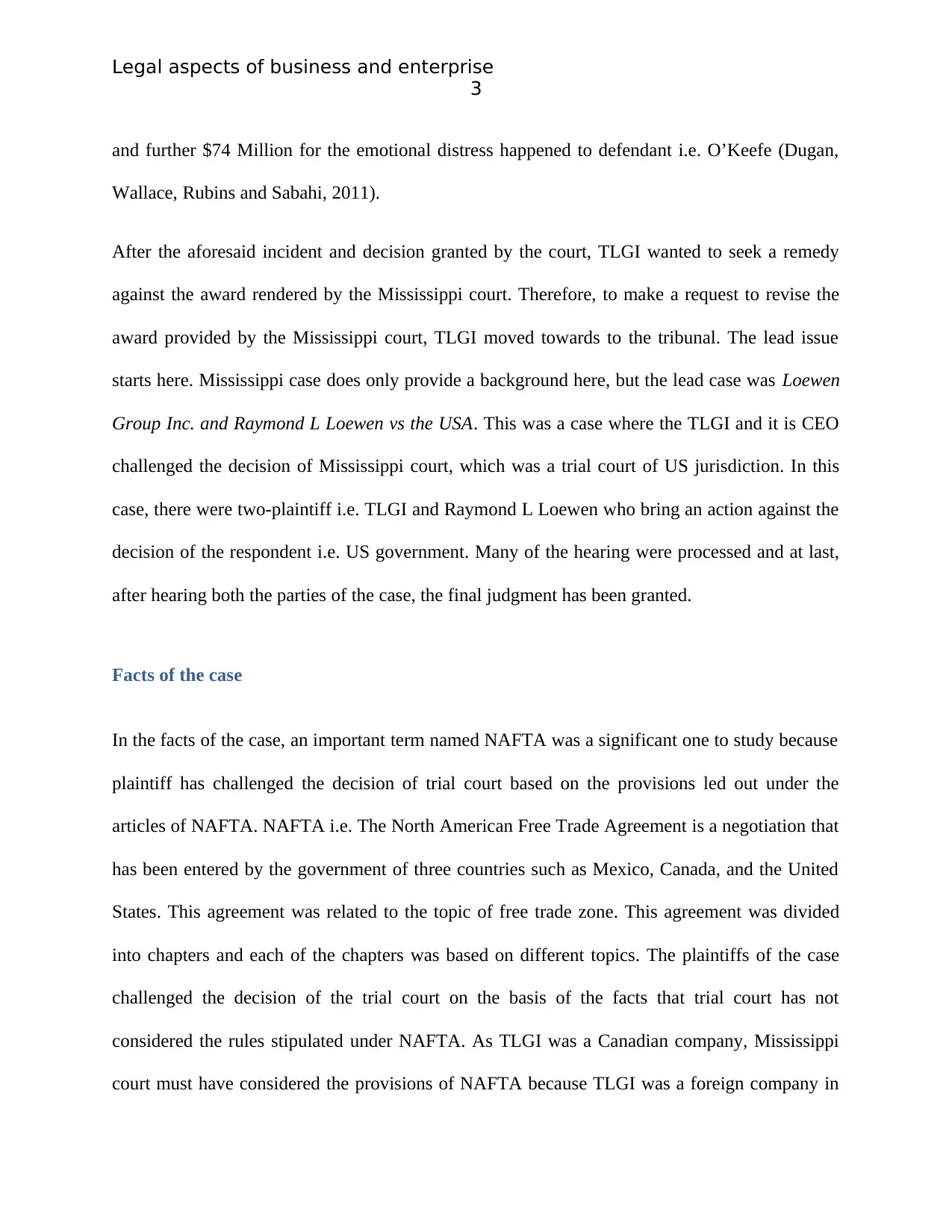
Legal aspects of business and enterprise
3
and further $74 Million for the emotional distress happened to defendant i.e. O’Keefe (Dugan,
Wallace, Rubins and Sabahi, 2011).
After the aforesaid incident and decision granted by the court, TLGI wanted to seek a remedy
against the award rendered by the Mississippi court. Therefore, to make a request to revise the
award provided by the Mississippi court, TLGI moved towards to the tribunal. The lead issue
starts here. Mississippi case does only provide a background here, but the lead case was Loewen
Group Inc. and Raymond L Loewen vs the USA. This was a case where the TLGI and it is CEO
challenged the decision of Mississippi court, which was a trial court of US jurisdiction. In this
case, there were two-plaintiff i.e. TLGI and Raymond L Loewen who bring an action against the
decision of the respondent i.e. US government. Many of the hearing were processed and at last,
after hearing both the parties of the case, the final judgment has been granted.
Facts of the case
In the facts of the case, an important term named NAFTA was a significant one to study because
plaintiff has challenged the decision of trial court based on the provisions led out under the
articles of NAFTA. NAFTA i.e. The North American Free Trade Agreement is a negotiation that
has been entered by the government of three countries such as Mexico, Canada, and the United
States. This agreement was related to the topic of free trade zone. This agreement was divided
into chapters and each of the chapters was based on different topics. The plaintiffs of the case
challenged the decision of the trial court on the basis of the facts that trial court has not
considered the rules stipulated under NAFTA. As TLGI was a Canadian company, Mississippi
court must have considered the provisions of NAFTA because TLGI was a foreign company in
3
and further $74 Million for the emotional distress happened to defendant i.e. O’Keefe (Dugan,
Wallace, Rubins and Sabahi, 2011).
After the aforesaid incident and decision granted by the court, TLGI wanted to seek a remedy
against the award rendered by the Mississippi court. Therefore, to make a request to revise the
award provided by the Mississippi court, TLGI moved towards to the tribunal. The lead issue
starts here. Mississippi case does only provide a background here, but the lead case was Loewen
Group Inc. and Raymond L Loewen vs the USA. This was a case where the TLGI and it is CEO
challenged the decision of Mississippi court, which was a trial court of US jurisdiction. In this
case, there were two-plaintiff i.e. TLGI and Raymond L Loewen who bring an action against the
decision of the respondent i.e. US government. Many of the hearing were processed and at last,
after hearing both the parties of the case, the final judgment has been granted.
Facts of the case
In the facts of the case, an important term named NAFTA was a significant one to study because
plaintiff has challenged the decision of trial court based on the provisions led out under the
articles of NAFTA. NAFTA i.e. The North American Free Trade Agreement is a negotiation that
has been entered by the government of three countries such as Mexico, Canada, and the United
States. This agreement was related to the topic of free trade zone. This agreement was divided
into chapters and each of the chapters was based on different topics. The plaintiffs of the case
challenged the decision of the trial court on the basis of the facts that trial court has not
considered the rules stipulated under NAFTA. As TLGI was a Canadian company, Mississippi
court must have considered the provisions of NAFTA because TLGI was a foreign company in
Paraphrase This Document
Need a fresh take? Get an instant paraphrase of this document with our AI Paraphraser
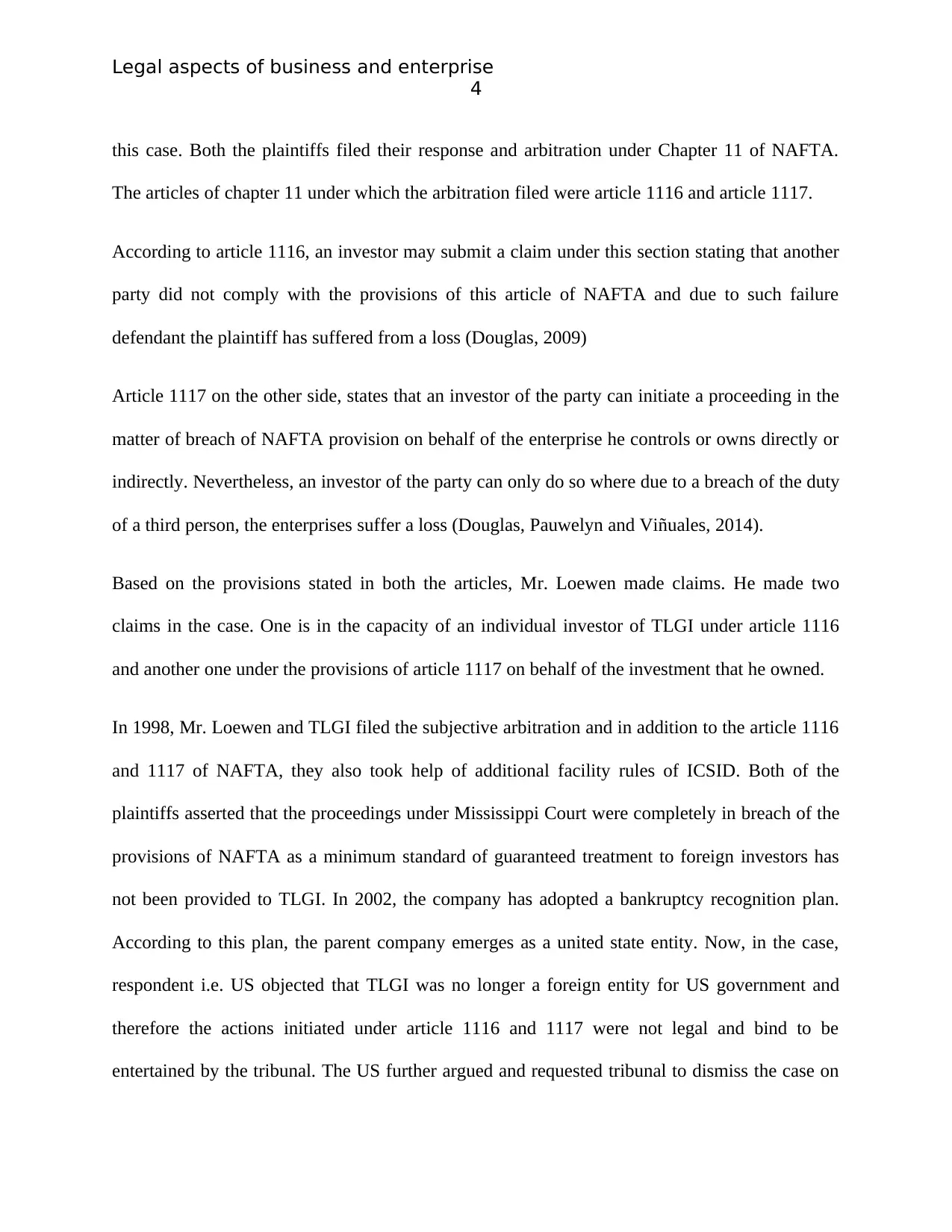
Legal aspects of business and enterprise
4
this case. Both the plaintiffs filed their response and arbitration under Chapter 11 of NAFTA.
The articles of chapter 11 under which the arbitration filed were article 1116 and article 1117.
According to article 1116, an investor may submit a claim under this section stating that another
party did not comply with the provisions of this article of NAFTA and due to such failure
defendant the plaintiff has suffered from a loss (Douglas, 2009)
Article 1117 on the other side, states that an investor of the party can initiate a proceeding in the
matter of breach of NAFTA provision on behalf of the enterprise he controls or owns directly or
indirectly. Nevertheless, an investor of the party can only do so where due to a breach of the duty
of a third person, the enterprises suffer a loss (Douglas, Pauwelyn and Viñuales, 2014).
Based on the provisions stated in both the articles, Mr. Loewen made claims. He made two
claims in the case. One is in the capacity of an individual investor of TLGI under article 1116
and another one under the provisions of article 1117 on behalf of the investment that he owned.
In 1998, Mr. Loewen and TLGI filed the subjective arbitration and in addition to the article 1116
and 1117 of NAFTA, they also took help of additional facility rules of ICSID. Both of the
plaintiffs asserted that the proceedings under Mississippi Court were completely in breach of the
provisions of NAFTA as a minimum standard of guaranteed treatment to foreign investors has
not been provided to TLGI. In 2002, the company has adopted a bankruptcy recognition plan.
According to this plan, the parent company emerges as a united state entity. Now, in the case,
respondent i.e. US objected that TLGI was no longer a foreign entity for US government and
therefore the actions initiated under article 1116 and 1117 were not legal and bind to be
entertained by the tribunal. The US further argued and requested tribunal to dismiss the case on
4
this case. Both the plaintiffs filed their response and arbitration under Chapter 11 of NAFTA.
The articles of chapter 11 under which the arbitration filed were article 1116 and article 1117.
According to article 1116, an investor may submit a claim under this section stating that another
party did not comply with the provisions of this article of NAFTA and due to such failure
defendant the plaintiff has suffered from a loss (Douglas, 2009)
Article 1117 on the other side, states that an investor of the party can initiate a proceeding in the
matter of breach of NAFTA provision on behalf of the enterprise he controls or owns directly or
indirectly. Nevertheless, an investor of the party can only do so where due to a breach of the duty
of a third person, the enterprises suffer a loss (Douglas, Pauwelyn and Viñuales, 2014).
Based on the provisions stated in both the articles, Mr. Loewen made claims. He made two
claims in the case. One is in the capacity of an individual investor of TLGI under article 1116
and another one under the provisions of article 1117 on behalf of the investment that he owned.
In 1998, Mr. Loewen and TLGI filed the subjective arbitration and in addition to the article 1116
and 1117 of NAFTA, they also took help of additional facility rules of ICSID. Both of the
plaintiffs asserted that the proceedings under Mississippi Court were completely in breach of the
provisions of NAFTA as a minimum standard of guaranteed treatment to foreign investors has
not been provided to TLGI. In 2002, the company has adopted a bankruptcy recognition plan.
According to this plan, the parent company emerges as a united state entity. Now, in the case,
respondent i.e. US objected that TLGI was no longer a foreign entity for US government and
therefore the actions initiated under article 1116 and 1117 were not legal and bind to be
entertained by the tribunal. The US further argued and requested tribunal to dismiss the case on
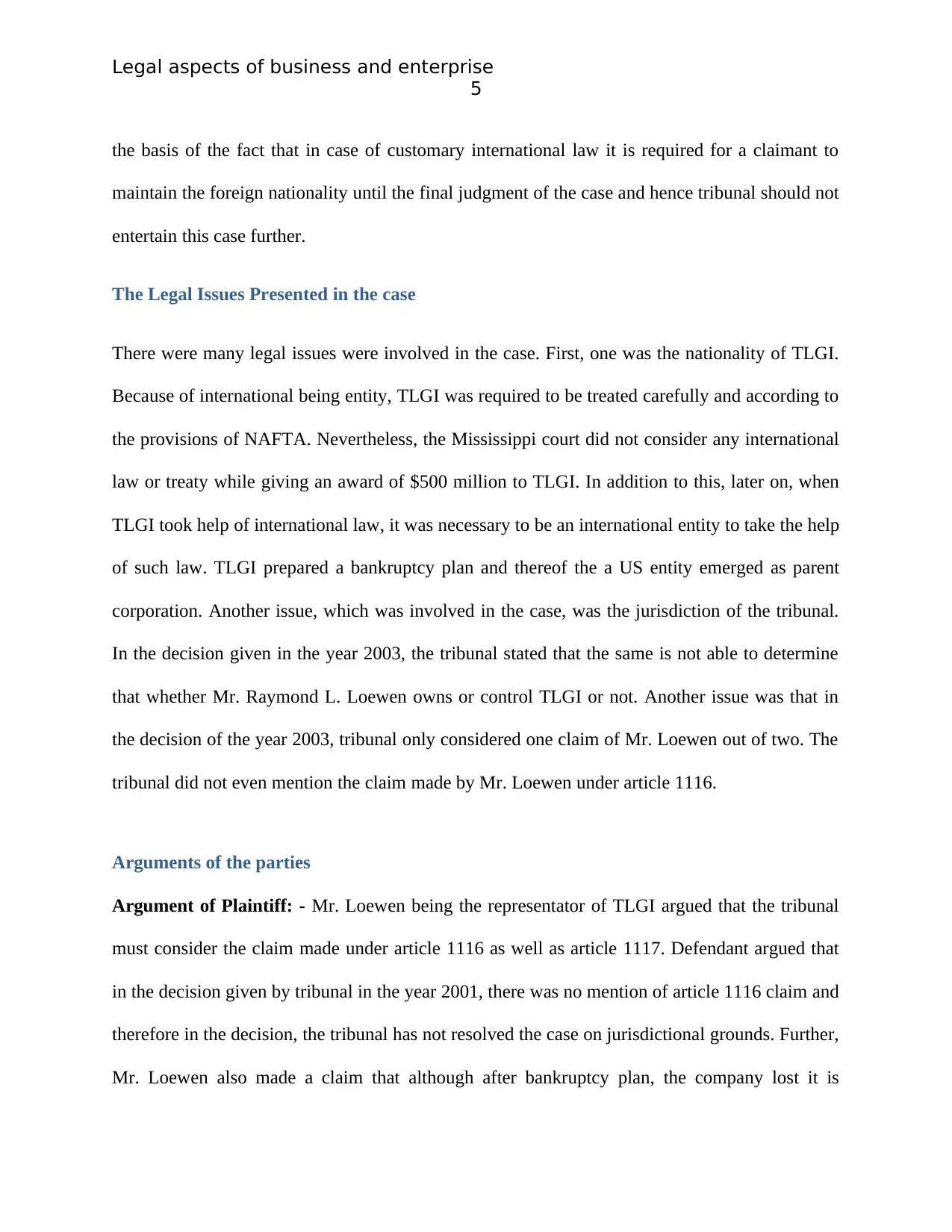
Legal aspects of business and enterprise
5
the basis of the fact that in case of customary international law it is required for a claimant to
maintain the foreign nationality until the final judgment of the case and hence tribunal should not
entertain this case further.
The Legal Issues Presented in the case
There were many legal issues were involved in the case. First, one was the nationality of TLGI.
Because of international being entity, TLGI was required to be treated carefully and according to
the provisions of NAFTA. Nevertheless, the Mississippi court did not consider any international
law or treaty while giving an award of $500 million to TLGI. In addition to this, later on, when
TLGI took help of international law, it was necessary to be an international entity to take the help
of such law. TLGI prepared a bankruptcy plan and thereof the a US entity emerged as parent
corporation. Another issue, which was involved in the case, was the jurisdiction of the tribunal.
In the decision given in the year 2003, the tribunal stated that the same is not able to determine
that whether Mr. Raymond L. Loewen owns or control TLGI or not. Another issue was that in
the decision of the year 2003, tribunal only considered one claim of Mr. Loewen out of two. The
tribunal did not even mention the claim made by Mr. Loewen under article 1116.
Arguments of the parties
Argument of Plaintiff: - Mr. Loewen being the representator of TLGI argued that the tribunal
must consider the claim made under article 1116 as well as article 1117. Defendant argued that
in the decision given by tribunal in the year 2001, there was no mention of article 1116 claim and
therefore in the decision, the tribunal has not resolved the case on jurisdictional grounds. Further,
Mr. Loewen also made a claim that although after bankruptcy plan, the company lost it is
5
the basis of the fact that in case of customary international law it is required for a claimant to
maintain the foreign nationality until the final judgment of the case and hence tribunal should not
entertain this case further.
The Legal Issues Presented in the case
There were many legal issues were involved in the case. First, one was the nationality of TLGI.
Because of international being entity, TLGI was required to be treated carefully and according to
the provisions of NAFTA. Nevertheless, the Mississippi court did not consider any international
law or treaty while giving an award of $500 million to TLGI. In addition to this, later on, when
TLGI took help of international law, it was necessary to be an international entity to take the help
of such law. TLGI prepared a bankruptcy plan and thereof the a US entity emerged as parent
corporation. Another issue, which was involved in the case, was the jurisdiction of the tribunal.
In the decision given in the year 2003, the tribunal stated that the same is not able to determine
that whether Mr. Raymond L. Loewen owns or control TLGI or not. Another issue was that in
the decision of the year 2003, tribunal only considered one claim of Mr. Loewen out of two. The
tribunal did not even mention the claim made by Mr. Loewen under article 1116.
Arguments of the parties
Argument of Plaintiff: - Mr. Loewen being the representator of TLGI argued that the tribunal
must consider the claim made under article 1116 as well as article 1117. Defendant argued that
in the decision given by tribunal in the year 2001, there was no mention of article 1116 claim and
therefore in the decision, the tribunal has not resolved the case on jurisdictional grounds. Further,
Mr. Loewen also made a claim that although after bankruptcy plan, the company lost it is
⊘ This is a preview!⊘
Do you want full access?
Subscribe today to unlock all pages.

Trusted by 1+ million students worldwide
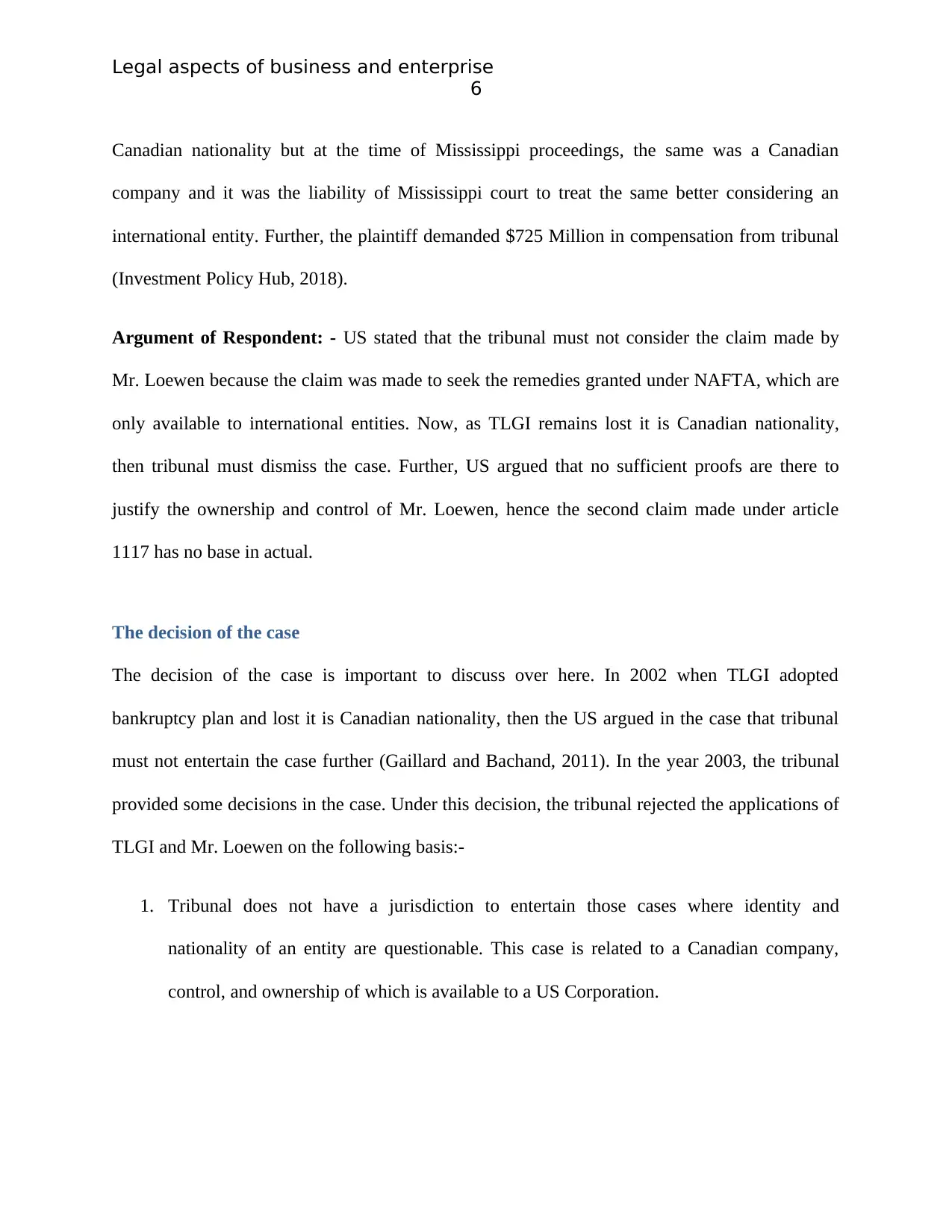
Legal aspects of business and enterprise
6
Canadian nationality but at the time of Mississippi proceedings, the same was a Canadian
company and it was the liability of Mississippi court to treat the same better considering an
international entity. Further, the plaintiff demanded $725 Million in compensation from tribunal
(Investment Policy Hub, 2018).
Argument of Respondent: - US stated that the tribunal must not consider the claim made by
Mr. Loewen because the claim was made to seek the remedies granted under NAFTA, which are
only available to international entities. Now, as TLGI remains lost it is Canadian nationality,
then tribunal must dismiss the case. Further, US argued that no sufficient proofs are there to
justify the ownership and control of Mr. Loewen, hence the second claim made under article
1117 has no base in actual.
The decision of the case
The decision of the case is important to discuss over here. In 2002 when TLGI adopted
bankruptcy plan and lost it is Canadian nationality, then the US argued in the case that tribunal
must not entertain the case further (Gaillard and Bachand, 2011). In the year 2003, the tribunal
provided some decisions in the case. Under this decision, the tribunal rejected the applications of
TLGI and Mr. Loewen on the following basis:-
1. Tribunal does not have a jurisdiction to entertain those cases where identity and
nationality of an entity are questionable. This case is related to a Canadian company,
control, and ownership of which is available to a US Corporation.
6
Canadian nationality but at the time of Mississippi proceedings, the same was a Canadian
company and it was the liability of Mississippi court to treat the same better considering an
international entity. Further, the plaintiff demanded $725 Million in compensation from tribunal
(Investment Policy Hub, 2018).
Argument of Respondent: - US stated that the tribunal must not consider the claim made by
Mr. Loewen because the claim was made to seek the remedies granted under NAFTA, which are
only available to international entities. Now, as TLGI remains lost it is Canadian nationality,
then tribunal must dismiss the case. Further, US argued that no sufficient proofs are there to
justify the ownership and control of Mr. Loewen, hence the second claim made under article
1117 has no base in actual.
The decision of the case
The decision of the case is important to discuss over here. In 2002 when TLGI adopted
bankruptcy plan and lost it is Canadian nationality, then the US argued in the case that tribunal
must not entertain the case further (Gaillard and Bachand, 2011). In the year 2003, the tribunal
provided some decisions in the case. Under this decision, the tribunal rejected the applications of
TLGI and Mr. Loewen on the following basis:-
1. Tribunal does not have a jurisdiction to entertain those cases where identity and
nationality of an entity are questionable. This case is related to a Canadian company,
control, and ownership of which is available to a US Corporation.
Paraphrase This Document
Need a fresh take? Get an instant paraphrase of this document with our AI Paraphraser
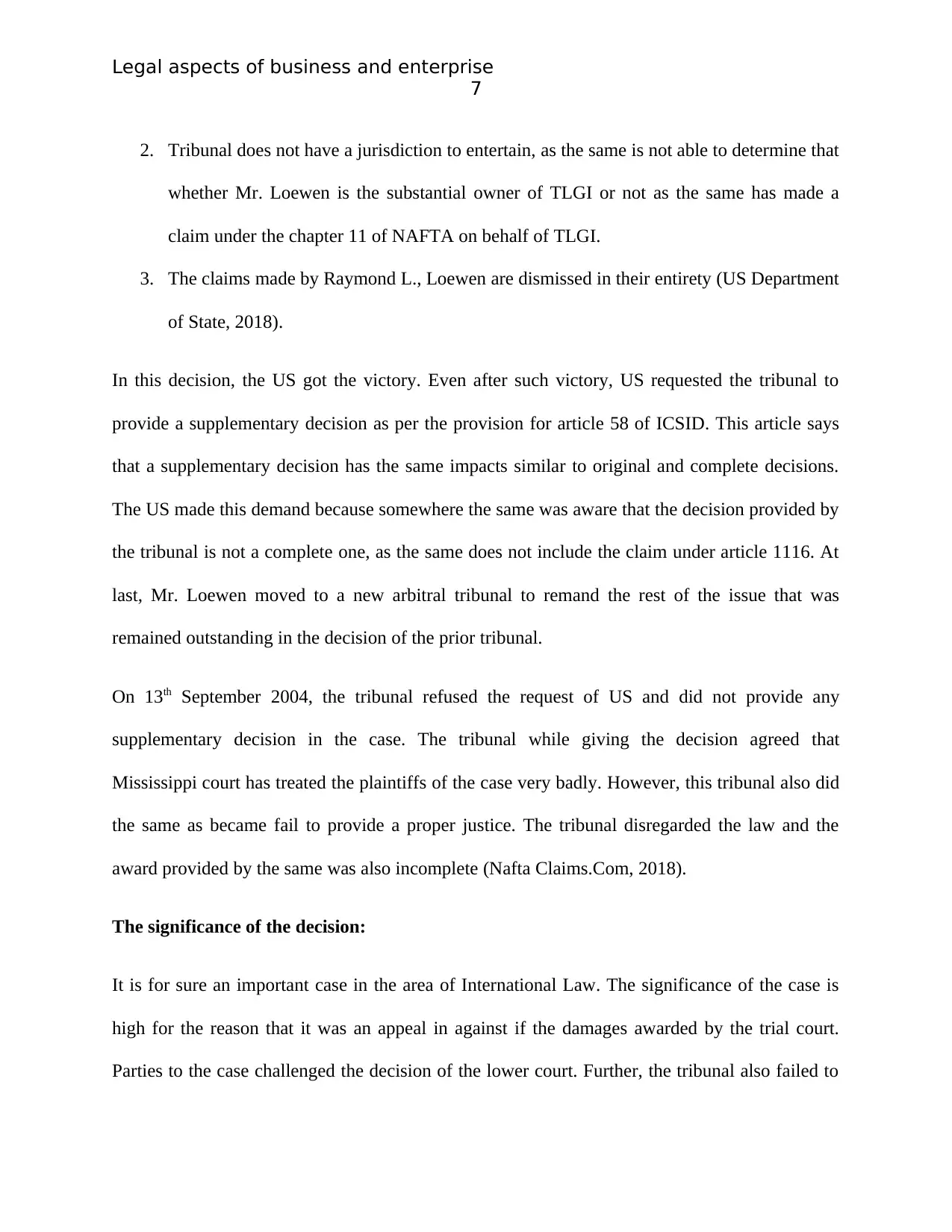
Legal aspects of business and enterprise
7
2. Tribunal does not have a jurisdiction to entertain, as the same is not able to determine that
whether Mr. Loewen is the substantial owner of TLGI or not as the same has made a
claim under the chapter 11 of NAFTA on behalf of TLGI.
3. The claims made by Raymond L., Loewen are dismissed in their entirety (US Department
of State, 2018).
In this decision, the US got the victory. Even after such victory, US requested the tribunal to
provide a supplementary decision as per the provision for article 58 of ICSID. This article says
that a supplementary decision has the same impacts similar to original and complete decisions.
The US made this demand because somewhere the same was aware that the decision provided by
the tribunal is not a complete one, as the same does not include the claim under article 1116. At
last, Mr. Loewen moved to a new arbitral tribunal to remand the rest of the issue that was
remained outstanding in the decision of the prior tribunal.
On 13th September 2004, the tribunal refused the request of US and did not provide any
supplementary decision in the case. The tribunal while giving the decision agreed that
Mississippi court has treated the plaintiffs of the case very badly. However, this tribunal also did
the same as became fail to provide a proper justice. The tribunal disregarded the law and the
award provided by the same was also incomplete (Nafta Claims.Com, 2018).
The significance of the decision:
It is for sure an important case in the area of International Law. The significance of the case is
high for the reason that it was an appeal in against if the damages awarded by the trial court.
Parties to the case challenged the decision of the lower court. Further, the tribunal also failed to
7
2. Tribunal does not have a jurisdiction to entertain, as the same is not able to determine that
whether Mr. Loewen is the substantial owner of TLGI or not as the same has made a
claim under the chapter 11 of NAFTA on behalf of TLGI.
3. The claims made by Raymond L., Loewen are dismissed in their entirety (US Department
of State, 2018).
In this decision, the US got the victory. Even after such victory, US requested the tribunal to
provide a supplementary decision as per the provision for article 58 of ICSID. This article says
that a supplementary decision has the same impacts similar to original and complete decisions.
The US made this demand because somewhere the same was aware that the decision provided by
the tribunal is not a complete one, as the same does not include the claim under article 1116. At
last, Mr. Loewen moved to a new arbitral tribunal to remand the rest of the issue that was
remained outstanding in the decision of the prior tribunal.
On 13th September 2004, the tribunal refused the request of US and did not provide any
supplementary decision in the case. The tribunal while giving the decision agreed that
Mississippi court has treated the plaintiffs of the case very badly. However, this tribunal also did
the same as became fail to provide a proper justice. The tribunal disregarded the law and the
award provided by the same was also incomplete (Nafta Claims.Com, 2018).
The significance of the decision:
It is for sure an important case in the area of International Law. The significance of the case is
high for the reason that it was an appeal in against if the damages awarded by the trial court.
Parties to the case challenged the decision of the lower court. Further, the tribunal also failed to
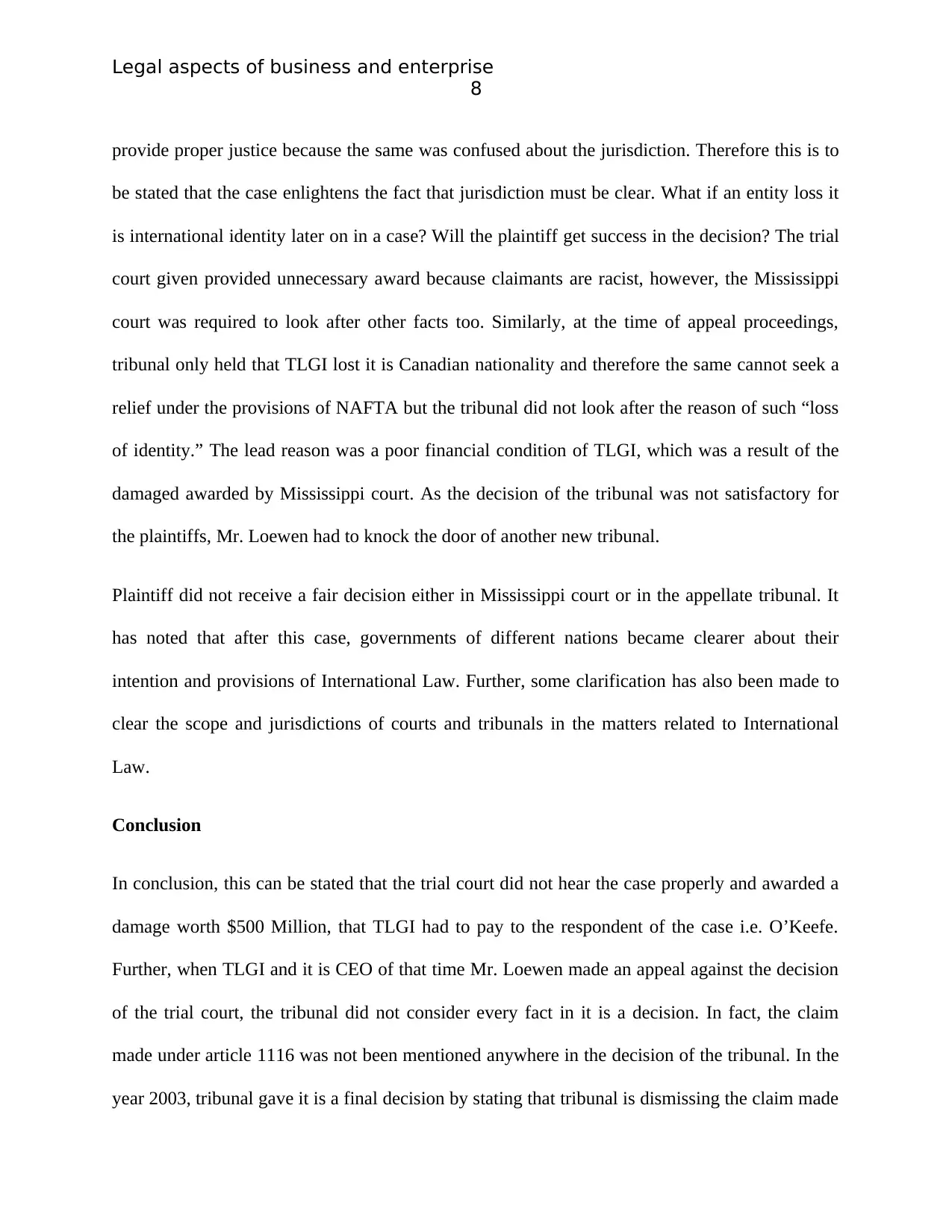
Legal aspects of business and enterprise
8
provide proper justice because the same was confused about the jurisdiction. Therefore this is to
be stated that the case enlightens the fact that jurisdiction must be clear. What if an entity loss it
is international identity later on in a case? Will the plaintiff get success in the decision? The trial
court given provided unnecessary award because claimants are racist, however, the Mississippi
court was required to look after other facts too. Similarly, at the time of appeal proceedings,
tribunal only held that TLGI lost it is Canadian nationality and therefore the same cannot seek a
relief under the provisions of NAFTA but the tribunal did not look after the reason of such “loss
of identity.” The lead reason was a poor financial condition of TLGI, which was a result of the
damaged awarded by Mississippi court. As the decision of the tribunal was not satisfactory for
the plaintiffs, Mr. Loewen had to knock the door of another new tribunal.
Plaintiff did not receive a fair decision either in Mississippi court or in the appellate tribunal. It
has noted that after this case, governments of different nations became clearer about their
intention and provisions of International Law. Further, some clarification has also been made to
clear the scope and jurisdictions of courts and tribunals in the matters related to International
Law.
Conclusion
In conclusion, this can be stated that the trial court did not hear the case properly and awarded a
damage worth $500 Million, that TLGI had to pay to the respondent of the case i.e. O’Keefe.
Further, when TLGI and it is CEO of that time Mr. Loewen made an appeal against the decision
of the trial court, the tribunal did not consider every fact in it is a decision. In fact, the claim
made under article 1116 was not been mentioned anywhere in the decision of the tribunal. In the
year 2003, tribunal gave it is a final decision by stating that tribunal is dismissing the claim made
8
provide proper justice because the same was confused about the jurisdiction. Therefore this is to
be stated that the case enlightens the fact that jurisdiction must be clear. What if an entity loss it
is international identity later on in a case? Will the plaintiff get success in the decision? The trial
court given provided unnecessary award because claimants are racist, however, the Mississippi
court was required to look after other facts too. Similarly, at the time of appeal proceedings,
tribunal only held that TLGI lost it is Canadian nationality and therefore the same cannot seek a
relief under the provisions of NAFTA but the tribunal did not look after the reason of such “loss
of identity.” The lead reason was a poor financial condition of TLGI, which was a result of the
damaged awarded by Mississippi court. As the decision of the tribunal was not satisfactory for
the plaintiffs, Mr. Loewen had to knock the door of another new tribunal.
Plaintiff did not receive a fair decision either in Mississippi court or in the appellate tribunal. It
has noted that after this case, governments of different nations became clearer about their
intention and provisions of International Law. Further, some clarification has also been made to
clear the scope and jurisdictions of courts and tribunals in the matters related to International
Law.
Conclusion
In conclusion, this can be stated that the trial court did not hear the case properly and awarded a
damage worth $500 Million, that TLGI had to pay to the respondent of the case i.e. O’Keefe.
Further, when TLGI and it is CEO of that time Mr. Loewen made an appeal against the decision
of the trial court, the tribunal did not consider every fact in it is a decision. In fact, the claim
made under article 1116 was not been mentioned anywhere in the decision of the tribunal. In the
year 2003, tribunal gave it is a final decision by stating that tribunal is dismissing the claim made
⊘ This is a preview!⊘
Do you want full access?
Subscribe today to unlock all pages.

Trusted by 1+ million students worldwide
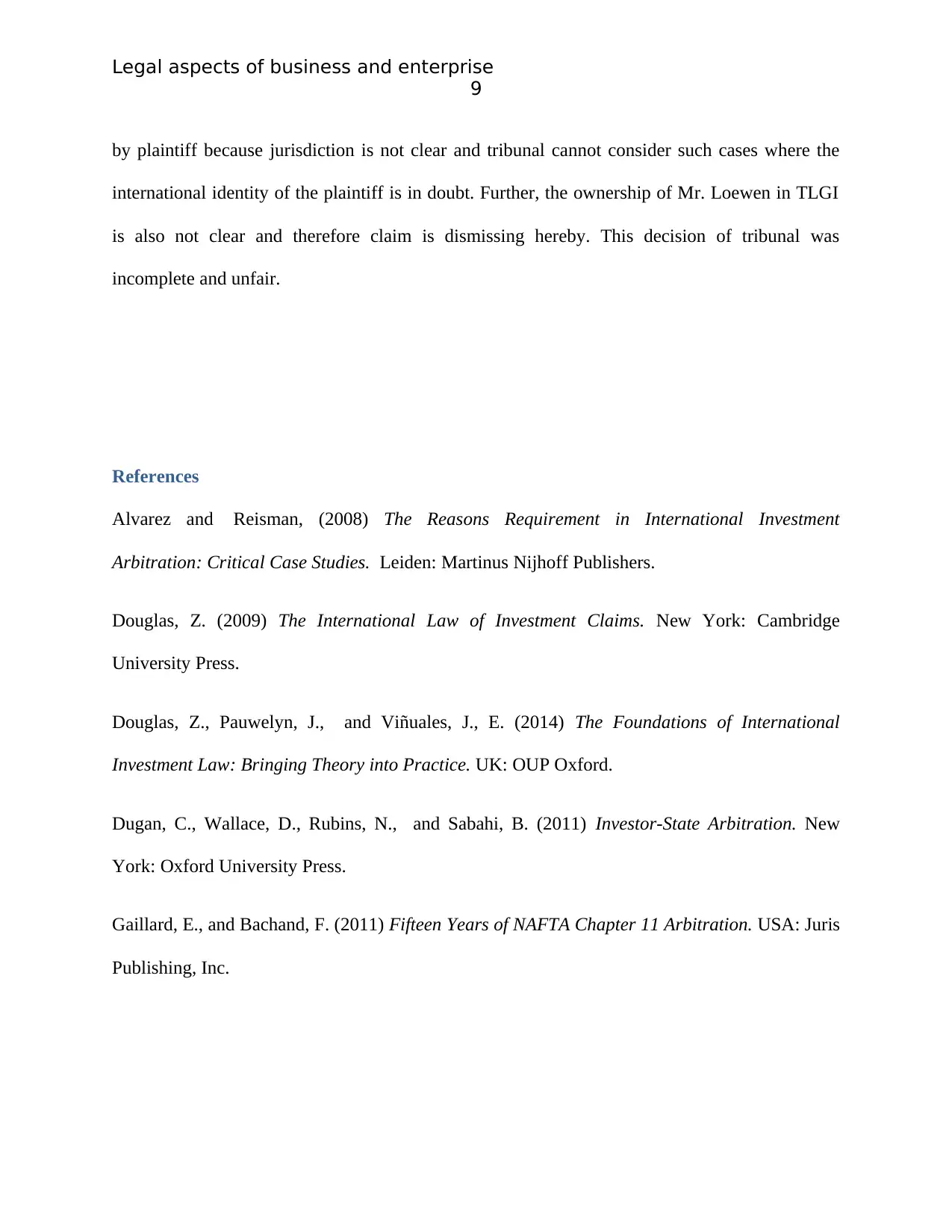
Legal aspects of business and enterprise
9
by plaintiff because jurisdiction is not clear and tribunal cannot consider such cases where the
international identity of the plaintiff is in doubt. Further, the ownership of Mr. Loewen in TLGI
is also not clear and therefore claim is dismissing hereby. This decision of tribunal was
incomplete and unfair.
References
Alvarez and Reisman, (2008) The Reasons Requirement in International Investment
Arbitration: Critical Case Studies. Leiden: Martinus Nijhoff Publishers.
Douglas, Z. (2009) The International Law of Investment Claims. New York: Cambridge
University Press.
Douglas, Z., Pauwelyn, J., and Viñuales, J., E. (2014) The Foundations of International
Investment Law: Bringing Theory into Practice. UK: OUP Oxford.
Dugan, C., Wallace, D., Rubins, N., and Sabahi, B. (2011) Investor-State Arbitration. New
York: Oxford University Press.
Gaillard, E., and Bachand, F. (2011) Fifteen Years of NAFTA Chapter 11 Arbitration. USA: Juris
Publishing, Inc.
9
by plaintiff because jurisdiction is not clear and tribunal cannot consider such cases where the
international identity of the plaintiff is in doubt. Further, the ownership of Mr. Loewen in TLGI
is also not clear and therefore claim is dismissing hereby. This decision of tribunal was
incomplete and unfair.
References
Alvarez and Reisman, (2008) The Reasons Requirement in International Investment
Arbitration: Critical Case Studies. Leiden: Martinus Nijhoff Publishers.
Douglas, Z. (2009) The International Law of Investment Claims. New York: Cambridge
University Press.
Douglas, Z., Pauwelyn, J., and Viñuales, J., E. (2014) The Foundations of International
Investment Law: Bringing Theory into Practice. UK: OUP Oxford.
Dugan, C., Wallace, D., Rubins, N., and Sabahi, B. (2011) Investor-State Arbitration. New
York: Oxford University Press.
Gaillard, E., and Bachand, F. (2011) Fifteen Years of NAFTA Chapter 11 Arbitration. USA: Juris
Publishing, Inc.
Paraphrase This Document
Need a fresh take? Get an instant paraphrase of this document with our AI Paraphraser
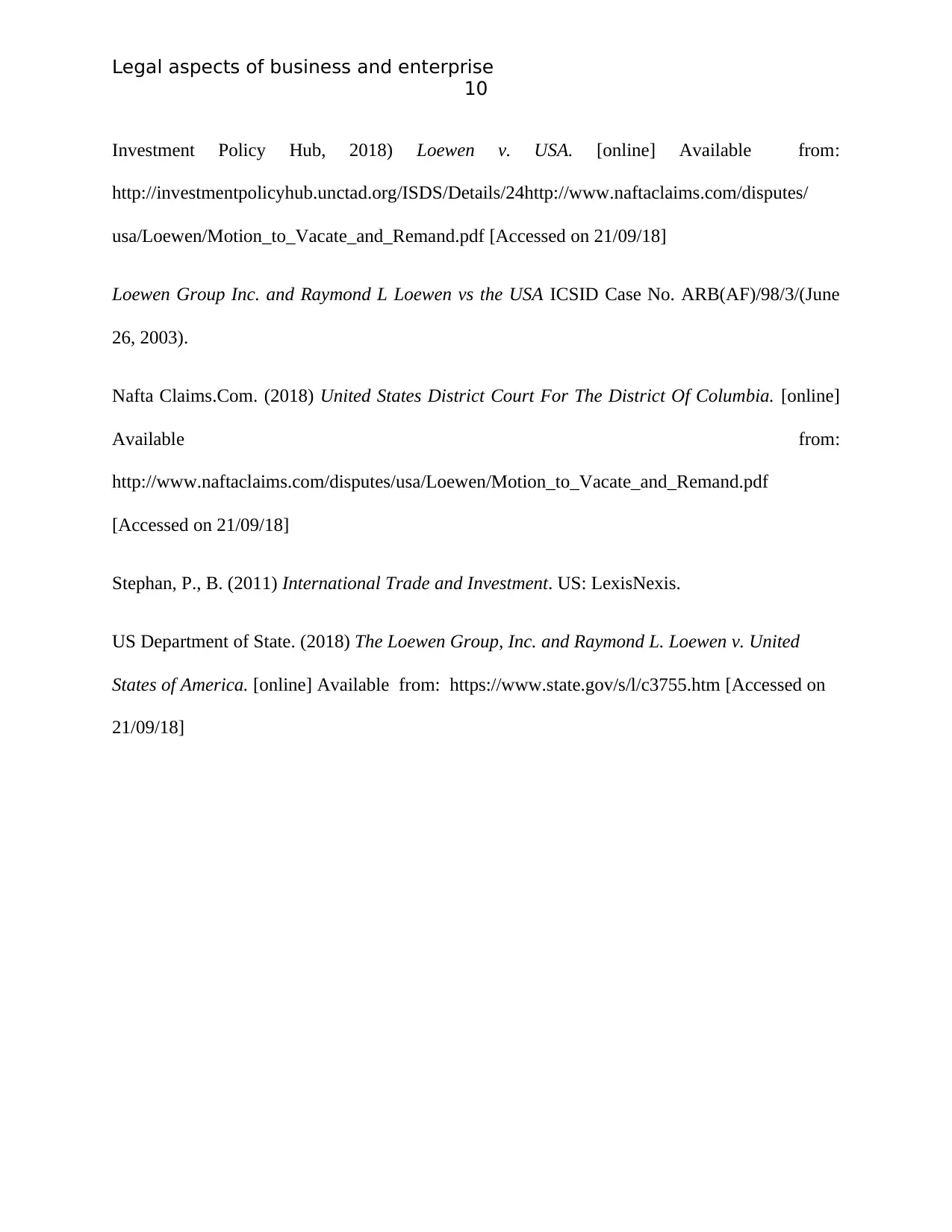
Legal aspects of business and enterprise
10
Investment Policy Hub, 2018) Loewen v. USA. [online] Available from:
http://investmentpolicyhub.unctad.org/ISDS/Details/24http://www.naftaclaims.com/disputes/
usa/Loewen/Motion_to_Vacate_and_Remand.pdf [Accessed on 21/09/18]
Loewen Group Inc. and Raymond L Loewen vs the USA ICSID Case No. ARB(AF)/98/3/(June
26, 2003).
Nafta Claims.Com. (2018) United States District Court For The District Of Columbia. [online]
Available from:
http://www.naftaclaims.com/disputes/usa/Loewen/Motion_to_Vacate_and_Remand.pdf
[Accessed on 21/09/18]
Stephan, P., B. (2011) International Trade and Investment. US: LexisNexis.
US Department of State. (2018) The Loewen Group, Inc. and Raymond L. Loewen v. United
States of America. [online] Available from: https://www.state.gov/s/l/c3755.htm [Accessed on
21/09/18]
10
Investment Policy Hub, 2018) Loewen v. USA. [online] Available from:
http://investmentpolicyhub.unctad.org/ISDS/Details/24http://www.naftaclaims.com/disputes/
usa/Loewen/Motion_to_Vacate_and_Remand.pdf [Accessed on 21/09/18]
Loewen Group Inc. and Raymond L Loewen vs the USA ICSID Case No. ARB(AF)/98/3/(June
26, 2003).
Nafta Claims.Com. (2018) United States District Court For The District Of Columbia. [online]
Available from:
http://www.naftaclaims.com/disputes/usa/Loewen/Motion_to_Vacate_and_Remand.pdf
[Accessed on 21/09/18]
Stephan, P., B. (2011) International Trade and Investment. US: LexisNexis.
US Department of State. (2018) The Loewen Group, Inc. and Raymond L. Loewen v. United
States of America. [online] Available from: https://www.state.gov/s/l/c3755.htm [Accessed on
21/09/18]
1 out of 11
Related Documents
Your All-in-One AI-Powered Toolkit for Academic Success.
+13062052269
info@desklib.com
Available 24*7 on WhatsApp / Email
![[object Object]](/_next/static/media/star-bottom.7253800d.svg)
Unlock your academic potential
Copyright © 2020–2026 A2Z Services. All Rights Reserved. Developed and managed by ZUCOL.





